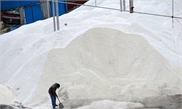SOURCE / INDUSTRIES
More metals besides rare earths can be used against US suppression

Mining of rare earths is conducted in Baiyunebo, North China's Inner Mongolia Autonomous Region on July 16, 2011. File photo: VCG
Besides a group of 17 rare-earth metals that China can cut supplies to the US for the latter's crackdown on Chinese companies, the Chinese government has another seven nonferrous metals vital for US defense and high-tech industries up its sleeves in reserve for retaliation, a senior expert said on Friday.
China's newly-passed law on export controls will pave the legal grounds before the government can utilize the seven metals in an export control way of fighting back, Zhou Shijian, a senior research fellow at the Center for US-China Relations at Tsinghua University, told the Global Times on Friday.
The metals, some of which China has been supplying the US since World War II in a metal-for-loan scheme, are of great value to US defense, information technology, aeronautics and aerospace.
China has an absolute advantage against the US in four of seven metals - tungsten, tin, antimony and molybdenum - in terms of supply, Zhou said.
For instance, China is the world's top supplier of tungsten, accounting for 70 percent of global mineral deposits, production and sales. The metal is vital to make alloys used in armor-piecing shells or bunker-buster bombs.
For another three metals - niobium, titanium and cobalt - the US has no deposits while China has plenty. And they are indispensable in making airplanes, missiles and rocket engines, said Zhou, a former vice president of the China Chamber of Commerce of Metals, Minerals and Chemicals Importers and Exporters.
China put export restrictions on some of the metals to the US in 2010, causing a WTO lawsuit, which ruled against China in 2012. China then dropped its export quota system in 2015.
However, China's new law on export controls, which will take effect on December 1, authorizes the government to take countermeasures against any country or region that abuses export control measures, and poses a threat to China's national security and interests.
"These metals are sold to foreign countries as general items," Zhou said. "The Ministry of Commerce could roll out documents to specify the nature of these metals for national defense use. That definition will give legal grounds for any ban or restriction of such metals."
China's Ministry of Commerce said at a press conference on Thursday that it will actively promote the legislative work of supporting regulations in the export law, and will further improve and release an export control list in a timely manner in accordance with the legal provisions.

